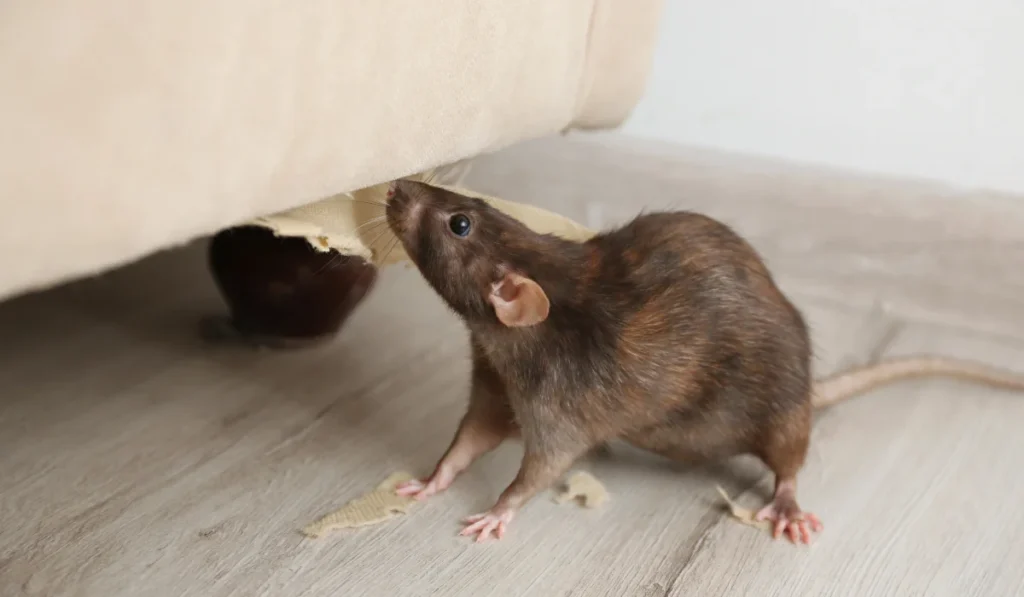
Rats and mice stay active all year in Dallas and the rest of North Texas, but it is easy to miss the early signs. Many homeowners only notice a problem after hearing scratching in the attic or finding droppings near the pantry.
Spotting the signs of rodents in Dallas, TX, early helps stop bigger issues, especially in older neighborhoods near White Rock Lake, Grapevine, and many Fort Worth suburbs. If you think the activity has already started, a rat exterminator & rodent control in Dallas-Fort Worth, TX, can check the home and stop the problem early.
These critters do not wait long to settle in. Once inside a Dallas home, they search for food, warm hiding spots, and open entry points. If no one stops them, a rodent infestation grows quickly and can cause significant damage, costing you money to fix. Knowing what to look for helps keep your family safe and your home protected.
In this guide, we will cover what signs of rodent activity look like, why they occur in Texas homes, the health risks they pose, and how a local pest control company like Forterra solves rodent problems for good.
One of the first signs of rodents that Dallas, TX, homeowners notice is droppings. Fresh droppings look dark brown, moist, and pointed on both ends. As they dry, they turn gray and crumble. Rat droppings are larger than mouse droppings, which stay small like grains of rice.
These signs often show up during rat infestations in Dallas, and you may find them inside pantries, behind appliances, or along baseboards where house mice travel.
Droppings often appear near food, showing the intruders already have a regular path. In many Dallas homes, the kitchen and garage become hot spots because food and storage areas sit close together. When droppings keep increasing, it usually means a growing rodent infestation that needs fast attention.
Hearing scratching noises inside walls or ceilings is one of the clearest signs of rodent activity. Roof rats move across attic beams, and house mice squeeze through wall gaps and move behind electrical wiring. Many homeowners in Dallas and Fort Worth notice these sounds late at night.
You may also hear:
If you hear these sounds more than once, a local exterminator should inspect the home. At Forterra Pest Control, we offer a free inspection to find nesting areas and the entry points rodents are using.
Rats and mice have incisors that never stop growing, so they chew constantly. Gnaw marks on doors, pantry corners, cabinets, and stored boxes often show up early.
Roof rats may chew rooflines, soffits, or exposed wood near the attic. Norway rats create burrows outside and chew openings through siding to reach crawl spaces.
Rub marks also appear along walls where rodents travel. These marks look like dark smudges caused by the oils on their fur. Over time, these trails show a clear path of movement through the home.
Chewing becomes dangerous when rodents bite into electrical wiring. Damaged wiring increases the risk of fire, so you should address rodent problems promptly.
We offer rodent exclusion that seals these entry points so the critters cannot return.
As a rodent problem grows, so do the smells. Strong odors often come from urine, feces, and nesting materials. Nests may show up in attics, insulation, basements, or stored items.
These same habits also make it harder to prevent rat poop in your Dallas yard or garden. Roof rats in Dallas tend to build nests above ground, while Norway rats stay lower and create burrows around foundations.
Entry points are usually small and easy to miss. Rodents squeeze through gaps around garage doors, rooflines, pipes, and worn door or window seals. Even openings the size of a quarter can let roof rats inside. Texas homes with older construction or weather-worn siding are more likely to have this problem.
Our team of rodent exterminators can check these hidden areas and use rodent exclusion to close every gap that lets pests inside.
Rats and mice pose health risks to families and pets. Their feces may spread salmonella, and their urine can contaminate stored food. In some cases, rodents carry fleas that travel through the home and bite people or pets.
House mice and roof rats may also spread hantavirus or leptospirosis, though these cases remain rare.
Even if you never see a rat or mouse, finding rat or mouse droppings is a strong reason to act. Our trained rodent removal team knows how to safely treat active areas without putting homeowners at risk.
If any of these health concerns apply to your situation, our preventive pest control services can help restore a healthy home environment through proven rodent-control measures.
Seeing signs of rodents in Dallas can feel overwhelming, especially when the problem seems to show up overnight. But the solution is simple: act early, get a detailed inspection, and set up long-term prevention measures. Droppings, gnaw marks, scratching noises, and rub marks all point to activity that will not go away on its own.
At Forterra Pest Control, we protect Dallas, Fort Worth, and nearby areas with safe products, honest pricing, and a clear promise. If the rodents come back, we come back.
Contact us today to schedule your free inspection and let our local team solve your rodent problem with dependable rodent control that lasts.
Rats leave larger droppings, wider gnaw marks, and louder scurrying sounds. Mice leave smaller droppings and usually stick closer to kitchens and pantries. A free inspection can confirm which species is active.
Common entry points include roof gaps, garage door seals, attic vents, wall openings, and plumbing lines. Even small openings can let house mice or roof rats inside.
Yes. Store traps may help with a few mice, but larger rodent problems require sealing entry points, removing nests, and applying proper rodent control methods that only a trained technician can provide.
